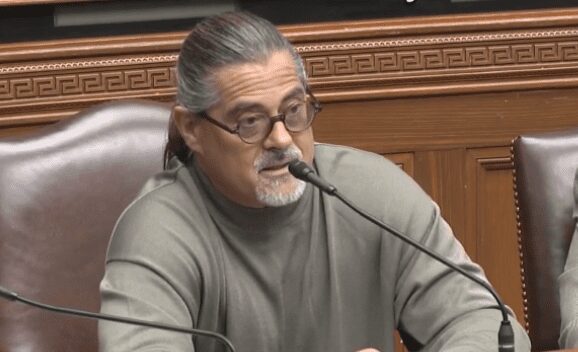Louisiana Court Officials Resist Reforms to End the Predatory Fines and Fees that Fund Their Offices
Conflicts of interest and gaps in basic information stall the years-long effort to shift one of the poorest states in the country away from a system of court funding that feeds on its poorest residents.
| April 1, 2022

Carl Richard, a city marshal in Shreveport, Louisiana, spoke in opposition to efforts to change how Louisiana courts are funded at a January 31 hearing. Speaking on behalf of the Louisiana City Marshals and City Constables Association, the court officers responsible for collecting the fines and fees that fund their operations, Richard told members that courts around the state could lose staff and won’t be able to replace old computers if the state adopts reforms that move away from relying on imposing financial charges on often-poor criminal defendants.
“Leave the court costs alone on traffic tickets, criminal matters and things in city courts,” Richard pleaded. “None of us were around when these court costs were put on the tickets, but we’re having to live with them now.”
Lawmakers created the Louisiana Commission on Justice System Funding in 2019, in part to look for ways to fund local courts that won’t trap poor people in a cycle of debt and incarceration. Like many states, Louisiana levies fines and fees on criminal defendants to fund a significant portion of essential government functions, including the court system.
Court fees raise money for clerks, sheriffs, marshals, public defenders, buildings and security, district attorneys, juries, postage, crime labs, the local Crime Stoppers nonprofit, and many more. These small fees add up for defendants, often accompanied by surcharges for missed payments. A simple traffic ticket can balloon into hundreds or thousands of dollars if you cannot afford to pay. Then, if you don’t appear for their court date, you may be arrested, with contempt fines added.
But three years after lawmakers created the funding commission, wary local officials continue to resist reforms. Meanwhile, the state’s commission on court funding has sputtered without issuing substantial recommendations or even compiling some of the basic information needed to help reform a system that’s both morally dubious and financially unstable.
Will Harrell, an attorney with the New Orleans-based Voice of the Experienced who sits on the commission, said at the January meeting that he felt “depressed” and “almost physically ill” by the lack of movement—citing the resistance of local officials like Richard. “We’re all in agreement that we need to move away from fines and fees… but not the fines and fees that fund my office,” Harrell said. “We’re three years into this, spinning [our] wheels, we’ve not come up with a solid commitment to go to the appropriations committee and say here’s what we need to move forward.”

Louisiana’s funding commission is part of a larger attempt by lawmakers to address deep inequities in the state’s criminal legal system. About a third of Louisiana’s population is Black, but Black people make up nearly two thirds of the state’s prison population. Poor and Black Louisianans also disproportionately pay court fines, monetary punishments meant to deter lawbreaking, and fees, which courts impose to fund numerous services. The disparities exacerbate other inequities; Louisiana has the second-highest poverty rate in the country and also scores low on life expectancy, child well-being, and infant mortality, all of which are more likely to impact poor and Black Louisianans.
Similar organizing efforts to limit predatory methods of government funding are rocking other states. Last year, governors in 10 states signed legislative reforms to curb debt-based driving restrictions, according to the Fines and Fees Justice Center. Just two weeks ago, Oklahoma’s Senate passed legislation to reduce reliance on fines and fees and move toward a centralized system for funding courts.
States are starting to turn away from fines and fees in part because they are a lousy source of funding. A 2019 Brennan Center for Justice report found that it cost profiled Texas and New Mexico jurisdictions an average of $0.41 to collect fines and fees for every dollar raised. Funding from fines and fees is also volatile, and agencies dependent on them often see considerable fluctuations. The pandemic made this even more apparent, since reduced collections and closed court buildings meant fewer fines and fees collected.
Here again, the impact is often felt by the more vulnerable. Most public defenders’ offices across Louisiana faced budget deficits as traffic tickets fell by more than a quarter during the pandemic.
Sarah Whittington, a staff attorney with the New Orleans-based legal services organization Justice and Accountability Center (JAC), says fines and fees imposed on her clients seem disconnected from the reality of poverty. She recalled one client who owed $1,050 in court costs, and who started paying them off until the pandemic hit. No longer working and with his disability application pending, the man could no longer afford his monthly payment of $96, Whittington says. The judge’s solution: He would have to pay $400 in two months—equal to 55 hours of minimum wage work in Louisiana, at $7.25 an hour.
“Why is a criminal defendant paying for a D.A.R.E. program [or] a spinal injury fund?” Whittington said. “In recent years, if you wanted to go find money, raise money, it was going to be through criminal defendants.”
According to estimates based on 2018 legislative audit reports, district courts in the state rely on self-generated funds for 51 percent of their budgets; that number was 71 percent for city and parish courts. At such levels, fines and fees can be addictive revenue sources for city and state governments that have pledged not to raise taxes and whose federal funding has declined.
Once agencies are “used to having that money, they don’t want to address the fact that you’re asking defendants, many of whom have not been convicted of anything, to pay,” says Vanessa Spinazola, executive director of JAC and a member of the funding commission.
These conflicts of interest abound. Even public defenders in Louisiana receive additional funding per case if their client is convicted—which is to say if the public defender loses the case. Louisiana advocates have had success declaring some of these conflicts to be unconstitutional. In the federal cases Cain v. White and Caliste v. Cantrell in 2019, defendants with experience in the Orleans Parish Criminal District Court (in New Orleans) successfully argued that fines and fees represent a conflict of interest because judges levy costs that fund the court itself, meaning that judges assess fees that they then benefit from.
In Cain v. White, defendants who did not pay hundreds of dollars in fines were sent to jail for as long as two weeks, with their bonds each set at $20,000. Caliste v. Cantrell concerned defendants who were jailed for their inability to pay high bail amounts, including bail fees that help fund the court. In that case, a panel of three Fifth Circuit judges, two of whom were appointed by a Republican president, concluded that a judge both setting bail and relying on bail fees for court funding “pushes beyond what due process allows.”
Broader attempts to reform this system have dragged for years, however. Louisiana lawmakers seem to acknowledge its perverse incentives, with insufficient follow-through. In 2017, the state passed a legislative package meant to address the state’s inequitable criminal justice system. One act required that defendants’ abilities to pay fines and fees were accurately assessed, yet fears about harming court funding led the legislature to delay implementation of the law.
In 2019, lawmakers created the commission on justice funding to study alternative ways to fund the courts. The commission is a catch-all of stakeholders, from the DA association to advocacy organizations, and also actors that gain financially from the current system like bail bonds interest groups. Nearly half of those on the funding commission represent offices that themselves rely on fines and fees.
Officials’ support for change seems to extend only so far as their own funding isn’t threatened. When a vote went before the commission to recommend certain fees be eliminated, the recommendation narrowly failed, with support split almost entirely between those whose offices did and didn’t benefit from fines and fees.

In fact, the commission has issued no new recommendations for funding to state lawmakers three years after its inception. Commissioner Harrell, the attorney, lamented that they were becoming known as the “kick-the-can commission.”
“What the hell y’all been doing for these past three years?” Harrell asked fellow commissioners at a recent meeting.
“There have been commissions, there have been court cases, there has been legislative advocacy at the local level,” says Joanna Weiss, co-director of the Fines and Fees Justice Center. “What seems to be lacking is the will to change,” she says. “Because the legislature has the power to solve the problem.”
One reason for the delay seems to be the lack of basic information about fines and fees in Louisiana. Each court has its own collection methods and accounting practices. Last year, when state auditors gave the funding commission a presentation about collections and disbursement, fewer than five percent of the more than 1,500 offices that collect criminal fines and fees had reported that information to the state. The 77 agencies that responded to state auditors collected a total of $70.6 million in fines and fees in 2020; nearly a third of criminal fines were contempt fines.
Other states trying to shift away from user-funded systems have benefited from a unified system—meaning that local courts are connected with centralized administration, funding and data reporting.
Efforts to end Louisiana’s reliance on criminal fines and fees have also stalled despite bipartisan support. One member of the funding commission is Scott Peyton, Louisiana and Mississippi state director for Right on Crime, a conservative criminal justice organization. Peyton, a former probation officer, argues that burdening people with fines and fees actually decracts from public safety by contributing to recidivism.
“There were times I felt like a bill collector that wore a gun,” Peyton told Bolts.
When defendants could pay, it often wasn’t even them coming up with the money but rather grandmothers and girlfriends. One 2018 survey by the Alabama Appleseed Center for Law and Justice found that middle-aged Black women were more likely than any other demographic group to be paying off someone else’s debts from fines and fees.
Ashley White with The Bail Project in Baton Rouge, who has attended commission meetings to give public comment, said current reform discussions are “rooted in the assumption that [the justice system] has to be the same size or larger.”
Making the system smaller would reduce the funding it needs to operate. Louisiana has more appellate judges per capita than any other state. It’s even one of two states, along with Ohio, that has mayor’s courts; Louisiana has about 250 of these courts, which hear minor cases in towns with no city court.
The system has ballooned so large that lawmakers are chasing new sources of money from criminal defendants, even as they say they want to reform the system. Since 2017, 68 new criminal fees have been introduced in the Louisiana legislature, more than half of which have passed, according to an analysis by JAC.
In the current legislative session, advocates plan to fight any new fees that are introduced and hope to pass legislation to make creating new fees more difficult. One proposed bill seeks to abolish mayor’s courts in the state. There will also be a continued push for judges to be required to assess someone’s ability to pay when imposing fines and fees. Meanwhile, the funding commission will continue to meet and try to get a complete picture of how much revenue from fines and fees the court system actually uses to operate.
White says there need to be fundamental reforms to reinvest funding toward health, education, and social services, which would help divert people from interacting with the justice system at all. Smaller changes—like reducing fines and fees—likely can happen first.
But there are barriers to even these more modest changes, starting with the officials who benefit from the status quo. “People in Louisiana have made livelihoods off the back of mass incarceration,” White said.

